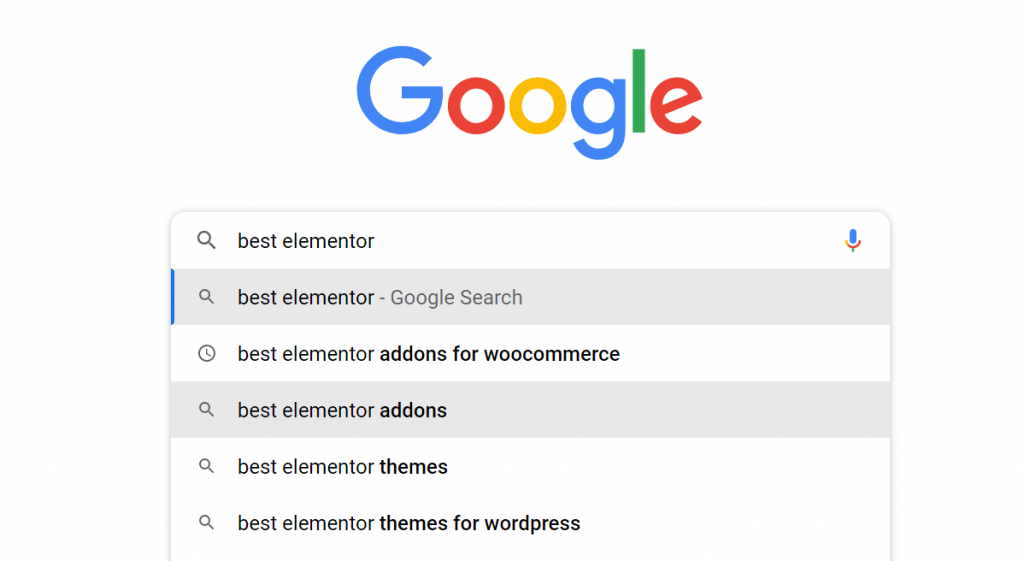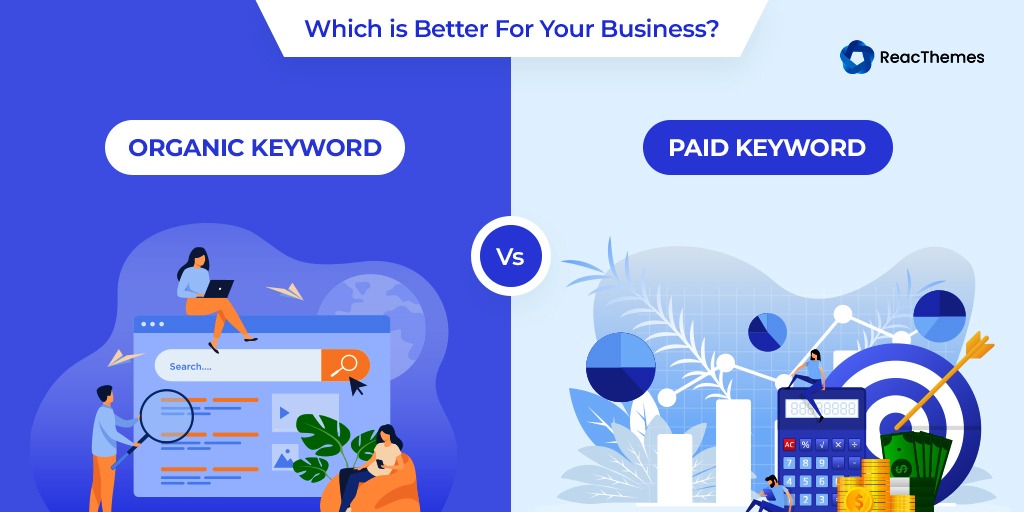When it comes to marketing a business online, there are two main types of keywords: organic and paid. Both have their own advantages and disadvantages, so it’s important to understand the difference between the two before deciding which is right for your business. Paid keywords are ones that you pay to appear in search engine results pages (SERPs), while organic keywords are ones that you earn through SEO.
In this article, we will dig out all the things and realities of these two types of keywords just to ensure a smooth understanding of the topic. So, without further ado, let’s dive deep.
What are Organic Keywords?
Organic keywords are those that are naturally written into the content of your website, as opposed to being placed there through paid advertising. These are the words and phrases that potential customers will use when they search for products or services related to what you offer. In order to ensure that your site appears in relevant search results, it’s important to use organic keywords throughout the content on your site, including in the titles and descriptions of your pages.

When selecting organic keywords for your website, it’s important to choose ones that are relevant to your business and that have a good search volume. You also want to make sure that you don’t choose keywords that are too broad, as this can result in your site getting lost in the search results.
Benefits of Organic Keywords
Organic keywords are those that are naturally integrated into your content, as opposed to being artificially injected. Many website owners attempt to game the system by buying keywords or using other black hat SEO tactics, but this can actually do more harm than good. Here are some benefits of organic keywords:
They’re more effective
Studies have shown that organic keywords are more effective at driving traffic and conversions than non-organic keywords. This is because people trust organic results more than they trust sponsored results.
They’re more affordable
If you’re on a tight budget, organic keywords are a great option. You don’t have to spend any money on keyword research or tools, and you can still get great results.
They’re more sustainable
Using organic keywords is a sustainable long-term strategy.
Disadvantages of Organic Keywords
Although organic keywords can be beneficial to your website’s ranking, there are also some disadvantages to consider.
One disadvantage of organic keywords is that they can be more difficult to target than paid keywords. This is because you have less control over where your organic keywords appear on your website. As a result, it can be more challenging to ensure that potential customers will see them.
In addition, organic keywords can take longer to show results than paid keywords. This is because it takes time for search engines to index and rank your website’s content. If you’re looking for immediate results, paid keywords may be a better option.
What are Paid Keywords?
Paid keywords are a type of keyword that businesses pay to have associated with their websites. The purpose of paid keywords is to increase the visibility of a website in search engine results pages (SERPs), with the goal of driving more traffic to the site.
When a business pays for a keyword, they are essentially bidding on that keyword in an auction-like process. The amount they are willing to pay per click (CPC) is a major factor in determining their position in the SERPs. The higher the CPC, the higher the position will be.

Paid keywords can be an effective way to drive traffic to a website, but it is important to use them wisely. Overpaying for keywords can eat into profits, and choosing keywords that are too broad or too competitive can make it difficult to achieve a high ranking.
Benefits of Paid Keywords
In a world where the average person is bombarded with lots of advertising messages each day, it’s no wonder that many businesses are turning to paid keywords to get their message across. Paid keywords are a form of online advertising that allows businesses to bid on certain keywords in order to have their ad appear in the sponsored results section of a search engine. Literally, there are a few key benefits of using paid keywords:
Increased visibility:
As mentioned above, one of the main benefits of paid keywords is that they can help increase your website’s visibility in SERPs which can lead to more clicks and conversions.
Greater control:
With paid keywords, you have greater control over which keywords you target than with organic SEO methods. This allows you to more precisely target your audience and improve your chances of appearing in front of them when they search for relevant terms.
Targeted traffic:
When you bid on relevant keywords, you’re more likely to attract targeted traffic that is interested in what you have to offer. This can lead to higher conversion rates and ROI.
Disadvantages of Paid Keywords
Paid keywords have several disadvantages that should be considered before investing in this type of marketing.
- First, paid keywords can be expensive, and the return on investment may not be worth the cost
- Second, paid keywords can attract a lot of spammy or low-quality traffic to your website, which can hurt your reputation and conversions
- Next, paid keywords can be difficult to track and measure effectively, making it hard to know if they are really working or not
- Another downside is that paid keywords can be very competitive, and it can be difficult to get your ad noticed
- Finally, paid keywords can be volatile, meaning they can change frequently, which can make it hard to keep up with the latest trends.
Why Do Paid and Natural Search Work So Well Together?
Paid and natural search work together to create a well-rounded marketing strategy that can help businesses reach their target audience more effectively. Paid search allows businesses to specifically target potential customers who are already interested in what they have to offer, while natural search helps businesses to build their brand and reputation online.
Studies have shown that combining paid and natural search can lead to a significant increase in website traffic and conversions. When used together, these two types of search can complement each other and provide a more comprehensive approach to online marketing. There are several reasons why paid and natural search work so well together.
- First, they both allow businesses to reach potential customers who are already interested in what they have to offer
- Second, they both help businesses build their brand and reputation online
- Finally, they both provide a more comprehensive approach to online marketing
Frequently Asked Questions (FAQs):
Q.1. What percentage of traffic should be organic?
Organic traffic continues to be the most valuable source of website traffic. In order to ensure that your website is getting the most out of its organic traffic, you need to make sure that a healthy percentage of your overall traffic is coming from organic sources.
How much of your website’s traffic should be organic? That’s a difficult question to answer, as it depends on a number of factors, including your industry, your competition, and your overall marketing goals.
Generally speaking, you should aim for a minimum of 50% of your website’s traffic to be organic. However, if you can get closer to 70-80%, that would be even better. Anything less than 50% and you may want to rethink your marketing strategy.
Q.2. What is a good organic conversion rate?
What is a “good” organic conversion rate? That’s a great question and one that doesn’t have a definitive answer. A variety of factors can influence your organic conversion rate, including the quality of your traffic, the relevancy of your keywords, and the overall user experience on your site.
That being said, there are some general benchmarks you can use to measure the success of your organic campaigns. For example, the average conversion rate for eCommerce sites is 2-3%. If your conversion rate is above average, you’re doing well. If it’s below average, there’s room for improvement.
Of course, there are always exceptions to the rule. Some sites may have a higher conversion rate due to a particularly strong offer or a well-targeted traffic.
Q.3. What’s a good eCommerce conversion rate?
Conversion rates for eCommerce can vary greatly depending on the industry, product, and price point. Generally, a good conversion rate is anything above 2%.
For example, in the clothing industry, the average conversion rate is about 2.5%. This means that for every 100 visitors to a clothing site, about 2.5 of them will make a purchase.
However, there are always outliers. For example, some high-end luxury brands have much lower conversion rates because their prices are so much higher. Conversely, some lower-priced items have higher conversion rates because they’re more affordable and people are more likely to impulse buy them.
In general, though, a good rule of thumb is that a conversion rate above 2% is considered good.
End Appearance on Organic Keywords Vs Paid Keywords
In conclusion, when choosing between organic keywords and paid keywords, it is important to consider what will work best for your business. If you have the time and resources to invest in organic keyword research and optimization, then this may be the better option for you. However, if you need results quickly or lack the resources to invest in organic keyword research, then using paid keywords may be your best bet. Ultimately, the decision comes down to what will work best for your business and its goals.








